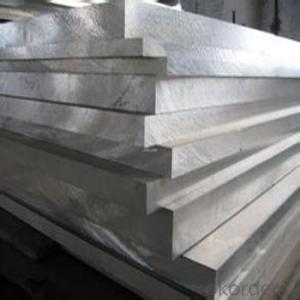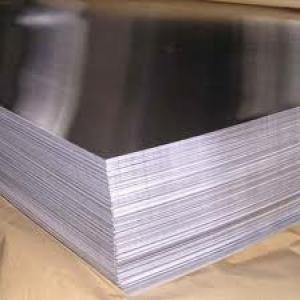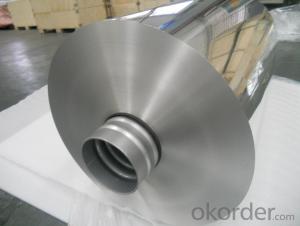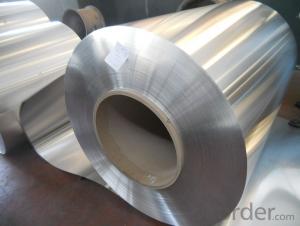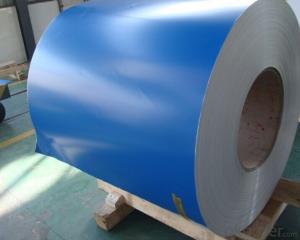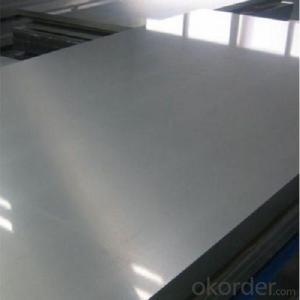Embossed Aluminum Sheet Plate Coil Foil Strip
- Loading Port:
- Shanghai
- Payment Terms:
- TT or LC
- Min Order Qty:
- 3 m.t.
- Supply Capability:
- 300 m.t./month
OKorder Service Pledge
OKorder Financial Service
You Might Also Like
1.Description
Aluminium foil (or aluminum foil) is aluminium prepared in thin metal leaves with a thickness less than 0.2 millimetres (8 mils); thinner gauges down to 6 micrometres (0.24 mils) are also commonly used.In the United States, foils are commonly gauged in thousandths of an inch or mils. Standard household foil is typically 0.016 mm (0.63 mils) thick, and heavy duty household foil is typically 0.024 mm (0.94 mils). Thefoil is pliable, and can be readily bent or wrapped around objects. Thin foils are fragile and are sometimeslaminated to other materials such as plastics or paper to make them more useful. Aluminium foil supplantedtin foil in the mid 20th century.
Annual production of aluminium foil was approximately 800,000 tonnes (880,000 tons) in Europe and 600,000 tonnes (660,000 tons) in the U.S. in 2003. Approximately 75% of aluminium foil is used for packaging offoods, cosmetics, and chemical products, and 25% used for industrial applications (e.g. thermal insulation, cables and electronics).
In North America, aluminium foil is known as aluminum foil. It was popularized by Reynolds Metals, the leading manufacturer in North America. In the United Kingdom and United States it is, informally, widely called tin foil, for historical reasons (similar to how aluminum cans are often still called "tin cans").Metallised films are sometimes mistaken for aluminium foil, but are actually polymer films coated with a thin layer of aluminium. In Australia, aluminium foil is widely called alfoil.
2. Our advantage:
We can supply best quality and best price!
3.Specification and application
EMBOSSED ALUMINIUM SHEET EMBOSSED ALUMINIUM SHEETS ALUMINIUM SHEETS
ALLOY : AA1***(AA1050,AA1060,AA1070,AA1100etc)
AA3***(AA3003,AA3004,AA3005,AA3105etc)
AA5***(AA5052 etc)
TEMPER:H14,H18,H24,H26,H32
THICKNESS:0.2mm-20mm
WIDTH:10mm-1500mm
EMBOSSED PATTERNS : Diamond, stucoo,bars etc
STANDARD: GB/T3880-2006
Special specification is available on customer's requirement
ALUMINIUM CIRCLE
ALLOY:AA1***(AA1050,AA1070,AA1100etc)
AA3***(AA3003 etc)
TEMPER:O,H14
THICKNESS:0.5mm-4mm
DIAGONAL:100mm-1200mm
STANDARD:GB/T 3880-2006
Special specification is available on customer's requirement
4.Pictures
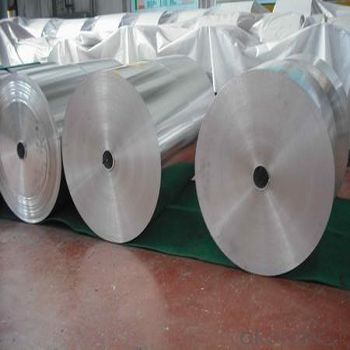
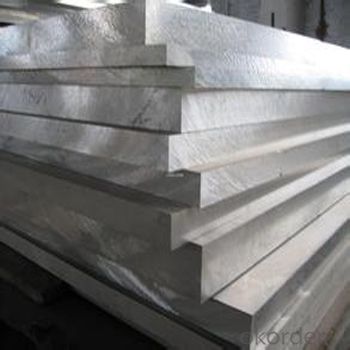
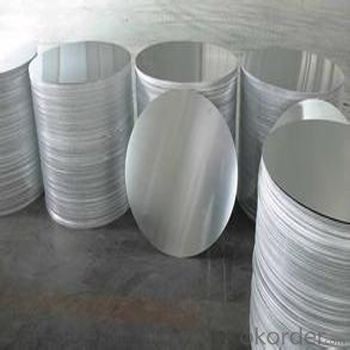
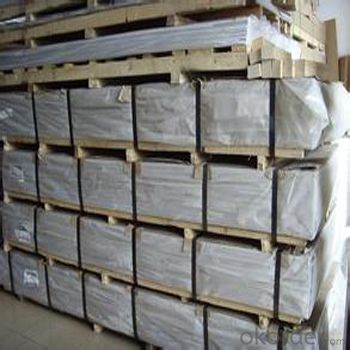
5.FAQ
1)How about our payment term?
LC and TT and other.
2)Which country can we supply?
All around the world!
- Q:Are the aluminum sheets suitable for manufacturing marine propellers?
- Yes, aluminum sheets are suitable for manufacturing marine propellers. Aluminum is a lightweight and corrosion-resistant material, making it ideal for use in marine environments where propellers are constantly exposed to water and harsh conditions. Aluminum propellers offer several advantages including high strength-to-weight ratio, improved fuel efficiency, and reduced maintenance costs. Additionally, aluminum is a cost-effective option compared to other materials such as stainless steel or bronze. Therefore, aluminum sheets are a suitable choice for manufacturing marine propellers.
- Q:Can the aluminum sheets be used for manufacturing chemical piping systems?
- Yes, aluminum sheets can be used for manufacturing chemical piping systems. Aluminum is known for its excellent corrosion resistance, which makes it suitable for handling various chemicals. It is also lightweight, making installation and maintenance easier. Additionally, aluminum has good thermal conductivity, allowing for efficient heat transfer in chemical processes. However, it is important to consider the specific requirements of the chemicals being transported and consult with experts to ensure that the aluminum sheets chosen have the necessary properties and are compatible with the chemicals to be used in the piping system.
- Q:What are the common surface treatments for aluminum sheets used in outdoor applications?
- The common surface treatments for aluminum sheets used in outdoor applications include anodizing, powder coating, and PVDF coating. Anodizing is an electrochemical process that creates a durable, corrosion-resistant layer on the surface of the aluminum sheet. It involves immersing the sheet in an electrolyte solution and applying a current to form a thick oxide layer. Anodized aluminum sheets are highly resistant to weathering, UV rays, and corrosion, making them suitable for outdoor applications. Powder coating is a dry finishing process where a powdered paint is electrostatically applied to the aluminum sheet. The sheet is then heated, causing the powder to melt and form a smooth, durable coating. Powder coating offers excellent resistance to weathering, scratches, and fading, making it ideal for outdoor use. Additionally, it provides a wide range of color options and a uniform, attractive appearance. PVDF (polyvinylidene fluoride) coating is a high-performance coating that combines resin with ceramic particles. This coating is applied as a liquid and then cured at high temperatures to form a continuous, protective film on the aluminum sheet. PVDF coatings provide exceptional resistance to fading, chalking, and chemical exposure, making them suitable for harsh outdoor environments. They also offer excellent color retention, durability, and resistance to UV rays. All these surface treatments enhance the durability, weather resistance, and aesthetic appeal of aluminum sheets, making them ideal for outdoor applications such as architectural facades, signage, transportation, and marine industries. It is important to select the appropriate surface treatment based on the specific requirements of the outdoor application, considering factors such as durability, color options, and resistance to weathering and corrosion.
- Q:Can aluminum sheets be embossed?
- Yes, aluminum sheets can be embossed.
- Q:Can aluminum sheets be welded or joined together?
- Yes, aluminum sheets can be welded or joined together. Aluminum is a highly weldable material and can be joined using various welding techniques such as gas tungsten arc welding (GTAW), gas metal arc welding (GMAW), and laser welding. These techniques utilize heat to melt the aluminum sheets and create a strong bond. Additionally, aluminum sheets can also be joined using mechanical fasteners like screws, rivets, or adhesive bonding. The choice of welding or joining method depends on the specific application and desired outcome.
- Q:Can aluminum sheet be used for automotive body panels?
- Yes, aluminum sheet can indeed be used for automotive body panels. Aluminum is a lightweight and corrosion-resistant material, making it desirable for improving fuel efficiency and increasing vehicle performance. It is widely used in the automotive industry to manufacture body panels, such as hoods, doors, fenders, and roofs, as it offers strength, durability, and design flexibility.
- Q:Can aluminum sheets be etched or engraved?
- Yes, aluminum sheets can be etched or engraved.
- Q:Which is better, a water bottle made out of steel or one made out of aluminum?
- Unless okorder / A lightweight Nalgene BPA free water bottle
- Q:Can aluminum sheets be polished?
- Certainly, aluminum sheets are capable of being polished. Aluminum, being a relatively malleable metal, lends itself to easier polishing in comparison to harder metals like stainless steel. The act of polishing aluminum sheets entails the utilization of abrasive substances such as sandpaper or polishing compounds. This serves to eliminate any blemishes, scratches, or oxidation present on the surface. Typically, the process involves multiple stages of polishing, employing varying degrees of grit in sandpaper or polishing compounds. Step by step, a smoother and more reflective surface is attained. Polished aluminum sheets find common usage in various applications, including automotive components, architectural elements, and ornamental objects. The polishing process elevates the metal's aesthetic appeal, imparting a glossy and reflective finish.
- Q:Are aluminum sheets suitable for use in electrical applications?
- Yes, aluminum sheets are suitable for use in electrical applications. Aluminum is an excellent conductor of electricity, and its high conductivity allows for efficient transmission of electrical current. Aluminum sheets are commonly used in electrical applications such as power transmission lines, electrical wiring, and electrical enclosures. Additionally, aluminum is lightweight, which makes it easier to handle and install. It is also resistant to corrosion, which ensures long-term durability and reliability in electrical systems. However, it is important to note that aluminum has a lower conductivity compared to copper, so it may require larger gauge sizes to compensate for this difference. Overall, aluminum sheets are a viable and cost-effective option for various electrical applications.
1. Manufacturer Overview |
|
|---|---|
| Location | |
| Year Established | |
| Annual Output Value | |
| Main Markets | |
| Company Certifications | |
2. Manufacturer Certificates |
|
|---|---|
| a) Certification Name | |
| Range | |
| Reference | |
| Validity Period | |
3. Manufacturer Capability |
|
|---|---|
| a)Trade Capacity | |
| Nearest Port | |
| Export Percentage | |
| No.of Employees in Trade Department | |
| Language Spoken: | |
| b)Factory Information | |
| Factory Size: | |
| No. of Production Lines | |
| Contract Manufacturing | |
| Product Price Range | |
Send your message to us
Embossed Aluminum Sheet Plate Coil Foil Strip
- Loading Port:
- Shanghai
- Payment Terms:
- TT or LC
- Min Order Qty:
- 3 m.t.
- Supply Capability:
- 300 m.t./month
OKorder Service Pledge
OKorder Financial Service
Similar products
New products
Hot products
Hot Searches
Related keywords

